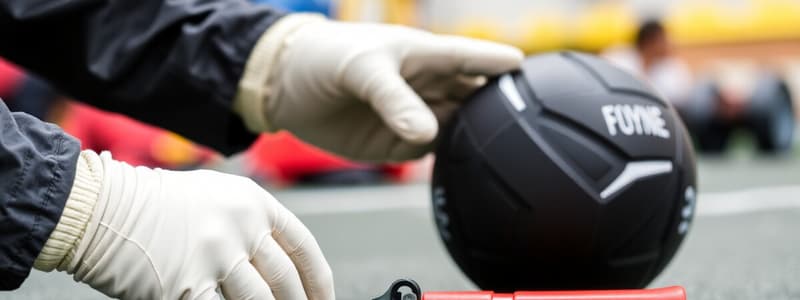Podcast
Questions and Answers
Quel est l'objectif principal des contrôles de sécurité sportifs ?
Quel est l'objectif principal des contrôles de sécurité sportifs ?
- Augmenter la popularité des événements
- Prévenir les blessures
- Améliorer la performance des athlètes
- Assurer la sécurité des participants (correct)
Quels éléments sont généralement inclus dans les contrôles de sécurité sportifs ?
Quels éléments sont généralement inclus dans les contrôles de sécurité sportifs ?
- Vérification de l'équipement utilisé (correct)
- Analyse des performances d'équipe
- Contrôle des entrées et sorties du site (correct)
- Évaluation de l'ambiance de l'événement
Pourquoi les contrôles de sécurité sportifs peuvent-ils être considérés comme inévitables ?
Pourquoi les contrôles de sécurité sportifs peuvent-ils être considérés comme inévitables ?
- Ils réduisent le coût des événements
- Ils permettent d'attirer plus de spectateurs
- Ils sont imposés par les fédérations sportives (correct)
- Ils garantissent des performances optimales
Quel aspect des contrôles de sécurité peut souvent être négligé ?
Quel aspect des contrôles de sécurité peut souvent être négligé ?
Quel est un inconvénient potentiel des contrôles de sécurité sportifs trop stricts ?
Quel est un inconvénient potentiel des contrôles de sécurité sportifs trop stricts ?
Flashcards
Contrôles de sécurité
Contrôles de sécurité
Mesures de sécurité préventives.
Contrôles sportifs
Contrôles sportifs
Tests et évaluations pour évaluer les aptitudes physiques.
Sécurité
Sécurité
Mesures prises pour prévenir les dangers.
Aptitudes physiques
Aptitudes physiques
Signup and view all the flashcards
Évaluation
Évaluation
Signup and view all the flashcards
Study Notes
Maintenance and Control of Sporting Equipment
- This presentation focuses on the maintenance and control of sporting equipment.
- Key documents and regulations are referenced, including the PIA 7.1.1, the sport code, decrees, and standards.
- Different actors involved in the maintenance process are detailed.
- Various types and frequencies of inspections are addressed, with a specific focus on a safety file.
- Methods for inspecting sporting equipment are explained.
- The responsibilities of personnel (especially supervisors) are defined regarding safety requirements.
- Equipment and facilities must be appropriate for the sport being played.
- The equipment's condition (including age and potential defects) must be surveyed before each training session.
- Personnel must report any equipment defects to their superiors.
- Personnel must ensure equipment is safe and not dangerous to use.
- Specific legal requirements (L421-3 of the consumer code) are outlined concerning products and services.
- Accidents involving sporting equipment are a recurring issue, sometimes with fatal consequences, often caused by lack of maintenance and control measures.
- Legal instruments, like the sport code (article L 322-2), outline the required safety standards for sporting facilities.
- ISO and European standards apply to sporting equipment in France, which may differ or be more stringent than national regulations. Specific examples of checks for football, handball, hockey, rugby, and basketball goals are provided, as outlined in the NFS 52-409 standard.
- Various actors play roles in the process, including the administrative training commander, prevention officer, sports officer/EPMS cell head, EPMS specialists, and various support personnel.
- Specific responsibilities are outlined for different officials within the administrative chain.
- Different control types are established: routine, operational, and principal, each with defined frequencies.
- The routine inspection process, including checking for equipment stability, installation, and general condition, is described.
- Detailed operational checks are provided, covering equipment features, markings, and general upkeep.
- Major checks on the condition (sturdiness and safety components) are conducted once every 12 months.
- Control frequencies vary depending on regulations, the type of sport, and/or any specific requirements (e.g., climbing ropes).
- A safety file is necessary and includes a technical file. This also includes site plans, links to contractors for equipment, instructional paperwork, maintenance reports, and other required information.
- A separate verification/action plan should be prepared, listing who is responsible for actions and their scheduled frequency.
- A safety register should be kept, documenting ongoing control, maintenance, and equipment use.
- A description of the equipment checks for sporting facilities (signage, paths, safety areas, equipment location) is outlined.
- The structural integrity (stability and material condition) and safety of sporting equipment areas (including potential sharp edges, cuts, oxidation, or loose fasteners/rivets) are key elements to be examined for control.
- Specific maintenance schedules and examples (such as for a climbing rope or a PETZL carabiner) are detailed.
- The presentation mentions several relevant regulations and standards to ensure safety in sporting facilities.
Studying That Suits You
Use AI to generate personalized quizzes and flashcards to suit your learning preferences.




